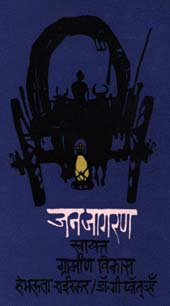Centre for Cooperative Research in Social
Sciences
(CCRSS, Pune, Maharashtra, India)
When change is viewed as transformation resulting from exogenous
intervention, research studies concentrate on such processes as transfer of
knowledge, control of conducts and practices, acceptance of new ideologies
brought from outside (see Epistemology of development
and social transformation).
One should on the contrary highlight autonomous processes of cultural
innovation, re-interpretation of alien values and ideologies (see
Sita's exile,
Stonemill and Bhakti, songs at
the grindmill, A performance capacity reactivated,
Grindmill songs and animation), spontaneous
innovations in the everyday life-styles, the development initiatives of
independent action groups (see
Communication, culture and power,
Grassroot socio-cultural action and development), in
general all moves where the traditional socio-cultural frameworks constitute the
spring-board for invention or happen to be creatively reshaped and reassessed
without breach of continuity.
 |
On the whole, emphasis should be put on internal impulses and
urges that motivate to dissent and challenge established structures, on forms
and ways of contest and discontinuity.
(See Unfettered Voices and
Autobiographies)
This raises significant methodological perspectives, in
particular the apparent contradiction of discourses of continuity significantly
legitimizing and carrying through changes within tradition. What could be the
status of concepts of social or cultural transformation when change occurs in
continuity and in the name of tradition? The assumption of an absolute
opposition of tradition -- as continuity or stagnant past -- to modernity -- as
power of transformation or dynamic present -- is really no more obvious nor
justified. Post-modernity makes sense above all as interface of the ancient and
the modern. |
Return to home page of Centre
for Cooperative Research in Social Sciences (CCRSS, Pune)
